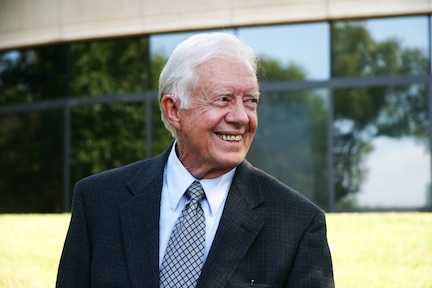Human rights is the soul of our foreign policy, because
human rights is the very soul of our sense of nationhood.
— Jimmy Carter
By Theodore Nollert
James Earl Carter, Jr.—better known as “Jimmy”—served our country as President from 1977-81. Born Oct. 1, 1924 in Plains, Georgia, Carter grew up in a house without electricity and indoor plumbing, and spent his early years stacking produce from his family’s farm. He graduated from the Naval Academy in Annapolis, Maryland, in 1946; that same year, he married Rosalynn Smith, with whom he had four children. He entered politics in 1962, becoming Governor of Georgia in 1970, and defeating Gerald Ford to win the presidency in the ’76 election.
Notable domestic achievements of Carter’s presidency included an increase of nearly 8 million jobs, a decrease in the budget deficit, the creation of the Department of Education, increased environmental protection, conservation of 103 million acres in Alaska, the decontrolling of petroleum prices, and the deregulation of the trucking and airline industries. Carter’s foreign policy was characterized by a staunch commitment to human rights, which earned him the ire of the Soviet Union. During his presidency, he obtained ratification for the Panama Canal treaties, negotiated the SALT II nuclear limitation treaty with the Soviet Union, established full diplomatic relations with China, and built amity between Egypt and Israel in the landmark Camp David Accords.
Attempts to curtail high inflation and interest rates set off a short recession which, coupled with the negative response to the Iranian hostage crisis, cost Carter the next election. But his successes since the Presidency have been prolific. Bouncing back from his electoral defeat, he gathered funds and support for the Carter Center, a nonpartisan organization dedicated to conflict resolution, human rights, global health, and creating economic opportunity, which opened in 1982. The Center’s successes have included reducing the incidence of the Guinea worm disease from 3.5 million cases in 1986 to 126 in 2014, making it the first human disease since smallpox likely to be eradicated; observing 100 elections in 38 countries to help establish and strengthen democracy; and contributing to disease prevention in Africa and Latin America. In addition to nearly eradicating the Guinea worm, the Carter Center has tackled river blindness, a condition prevalent in Africa and Latin America, distributing more than 100 million treatments since 1996.
Carter was an active diplomatic presence for the United States under subsequent Presidents. His diplomatic visits included trips to: Ethiopia and Eritrea (1989), Liberia (1991), Somalia (1993), North Korea (1994), Haiti and Bosnia (1994), Sudan (1995), the Great Lakes region of Africa (1995-96), Sudan and Uganda (1999), Cuba (2002), Venezuela (2002-2004), and the Middle East (2008). The year 1994 was a whirlwind for Carter’s diplomatic efforts: he brokered a nuclear freeze with Kim Il Sung, the resignation of Haitian General Raoul Cedras, and a cease-fire between Bosnian Muslims and Serbs. On his mission to Haiti, Carter convinced Cedras to step down and reinstate the deposed, democratically elected President Aristede. Carter’s long list of further successful diplomatic ventures demonstrate his commitment to democracy and human rights, as well as his diplomatic skill.
The service Carter has done for others has not gone unrecognized. In 1999 he received the Presidential Medal of Freedom, America’s highest civilian honor. When bestowing the honor, President Clinton said that “Jimmy and Rosalynn Carter have done more good for more people in more places than any other couple on the face of the earth.” Carter also won the Nobel Peace Prize in 2002 for his efforts “to find peaceful solutions to international conflicts, to advance democracy and human rights, and to promote economic and social development” through the Carter Center. He is a member of The Elders, a group whose motto is “independent global leaders working together for peace and human rights.”
Carter’s commitment to service also extends to simpler, though equally valuable, labor: each year since 1984 he and his wife have given a week of their time to Habitat for Humanity, which led to the development of the Jimmy and Rosalynn Carter Work Project. The Project has resulted in the construction of over 4,000 homes with the participation of 92,000 volunteers—including the Carters, each and every time.
Carter has written an astounding 24 books, another presidential record, and surpassed Herbert Hoover on September 8, 2012, to become the president with the longest retirement. He is now 90 years old, and as of August 15, 2015, faces a diagnosis of cancer in his liver and brain. In true Carter fashion, his response to the diagnosis has been focused on others. At an August 20 press conference, he announced that cancer had spread to his brain; moments later, when asked about his goals, he smiled and said, “I would like the last Guinea worm to die before I do.”
Theodore Nollert is a senior at Rhodes College in Memphis, Tennessee, studying English Literature. Rhodes is home to the Gamma of Tennessee Chapter of Phi Beta Kappa.




